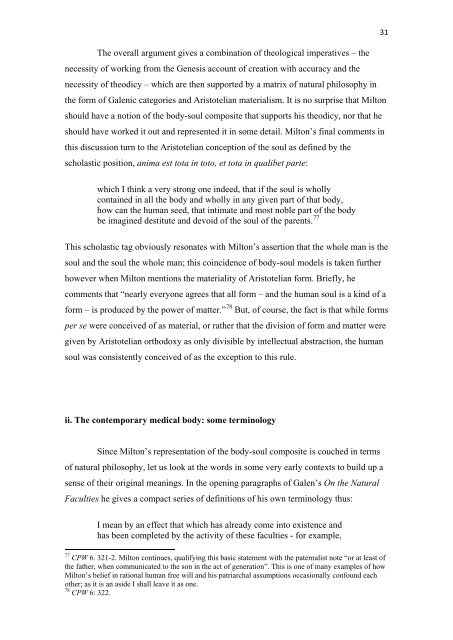Medical Science and the Anatomia Animata in Milton's Paradise Lost
Medical Science and the Anatomia Animata in Milton's Paradise Lost
Medical Science and the Anatomia Animata in Milton's Paradise Lost
You also want an ePaper? Increase the reach of your titles
YUMPU automatically turns print PDFs into web optimized ePapers that Google loves.
The overall argument gives a comb<strong>in</strong>ation of <strong>the</strong>ological imperatives – <strong>the</strong><br />
necessity of work<strong>in</strong>g from <strong>the</strong> Genesis account of creation with accuracy <strong>and</strong> <strong>the</strong><br />
necessity of <strong>the</strong>odicy – which are <strong>the</strong>n supported by a matrix of natural philosophy <strong>in</strong><br />
<strong>the</strong> form of Galenic categories <strong>and</strong> Aristotelian materialism. It is no surprise that Milton<br />
should have a notion of <strong>the</strong> body-soul composite that supports his <strong>the</strong>odicy, nor that he<br />
should have worked it out <strong>and</strong> represented it <strong>in</strong> some detail. Milton’s f<strong>in</strong>al comments <strong>in</strong><br />
this discussion turn to <strong>the</strong> Aristotelian conception of <strong>the</strong> soul as def<strong>in</strong>ed by <strong>the</strong><br />
scholastic position, anima est tota <strong>in</strong> toto, et tota <strong>in</strong> qualibet parte:<br />
which I th<strong>in</strong>k a very strong one <strong>in</strong>deed, that if <strong>the</strong> soul is wholly<br />
conta<strong>in</strong>ed <strong>in</strong> all <strong>the</strong> body <strong>and</strong> wholly <strong>in</strong> any given part of that body,<br />
how can <strong>the</strong> human seed, that <strong>in</strong>timate <strong>and</strong> most noble part of <strong>the</strong> body<br />
be imag<strong>in</strong>ed destitute <strong>and</strong> devoid of <strong>the</strong> soul of <strong>the</strong> parents. 77<br />
This scholastic tag obviously resonates with Milton’s assertion that <strong>the</strong> whole man is <strong>the</strong><br />
soul <strong>and</strong> <strong>the</strong> soul <strong>the</strong> whole man; this co<strong>in</strong>cidence of body-soul models is taken fur<strong>the</strong>r<br />
however when Milton mentions <strong>the</strong> materiality of Aristotelian form. Briefly, he<br />
comments that “nearly everyone agrees that all form – <strong>and</strong> <strong>the</strong> human soul is a k<strong>in</strong>d of a<br />
form – is produced by <strong>the</strong> power of matter.” 78<br />
But, of course, <strong>the</strong> fact is that while forms<br />
per se were conceived of as material, or ra<strong>the</strong>r that <strong>the</strong> division of form <strong>and</strong> matter were<br />
given by Aristotelian orthodoxy as only divisible by <strong>in</strong>tellectual abstraction, <strong>the</strong> human<br />
soul was consistently conceived of as <strong>the</strong> exception to this rule.<br />
ii. The contemporary medical body: some term<strong>in</strong>ology<br />
S<strong>in</strong>ce Milton’s representation of <strong>the</strong> body-soul composite is couched <strong>in</strong> terms<br />
of natural philosophy, let us look at <strong>the</strong> words <strong>in</strong> some very early contexts to build up a<br />
sense of <strong>the</strong>ir orig<strong>in</strong>al mean<strong>in</strong>gs. In <strong>the</strong> open<strong>in</strong>g paragraphs of Galen’s On <strong>the</strong> Natural<br />
Faculties he gives a compact series of def<strong>in</strong>itions of his own term<strong>in</strong>ology thus:<br />
I mean by an effect that which has already come <strong>in</strong>to existence <strong>and</strong><br />
has been completed by <strong>the</strong> activity of <strong>the</strong>se faculties - for example,<br />
77 CPW 6. 321-2. Milton cont<strong>in</strong>ues, qualify<strong>in</strong>g this basic statement with <strong>the</strong> paternalist note “or at least of<br />
<strong>the</strong> fa<strong>the</strong>r, when communicated to <strong>the</strong> son <strong>in</strong> <strong>the</strong> act of generation”. This is one of many examples of how<br />
Milton’s belief <strong>in</strong> rational human free will <strong>and</strong> his patriarchal assumptions occasionally confound each<br />
o<strong>the</strong>r; as it is an aside I shall leave it as one.<br />
78 CPW 6: 322.<br />
31
















